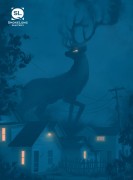“Your problem is not one of impunity,” said the tardigrade. She was sucking on a clump of moss, emptying it like a juice box. I felt that twinge of pique I get whenever someone slurps in my presence, but I put a lid on it. After all, I’d been the one to snatch her from her mossy habitat and dunk her in a petri dish full of rainwater. If your species persistently scrapes another species up with bathroom tweezers and subjects it to boiling, flash-freezing, radiation, and the vacuum of outer space, when you finally get a rare session of face time, you don’t have any right to be tetchy.
It was easy enough to find her in the moss pelt coating the concrete steps outside my laundry room. Capturing yourself a tardigrade is the common backyard work of microbiologists and middle-schoolers. What I wanted to do was make contact. I built it myself: a communication interface, molecularly cultivated in rainwater and linked to my Bluetooth headset. It took time, that’s for sure. But that was all right; I required time to formulate my inquiry. And the tardigrades aren’t going anywhere.
Even when we finally hooked up, I had to exercise patience. If I didn’t remain stuck to the microscope’s eyepieces, watching her wriggle after the particles of moss I’d offered as familiar-furniture-slash-snack, the silent pauses were overwhelming. I wanted to get straight to the point, but the tardigrade didn’t know me from Eve. It occurred to me to break the ice with a chat about the name “tardigrade” itself. Can you really call someone a “slow stepper” if she’s practically immortal? What’s a few ponderous hours of nematode-gazing when you’ve got plenty of time on your eight stubby limbs? The designation was news to my soggy guest. So was “water bear,” though she said she once had a suitor who happened to call her “moss piglet.” I asked if he’d been successful in his seduction. Through the microscope, I thought I saw the tardigrade shrug. “He was laboring against some pretty big odds,” she said. “My type goes for parthenogenesis.”
I figured it was time to ask my question. On a flash drive inserted into the microscope, I’d loaded a series of hashtagged feeds, ready to be piped in through the rainwater interface. I could have led with that, but—like I said—I thought it was best to get acquainted first.
“You may have guessed,” I began, “that my species is preoccupied with your extremophilic nature.” The tardigrade was no doubt familiar with our ever-expanding efforts to discover new catastrophes her durable phylum might outlive. I wasn’t sure she’d appreciate my broaching the subject. But her head bobbed in a vertically oriented gesture I took for a nod. I felt an upsurge of the fan worship humans harbor toward the tardigrade: all that placid resilience in such a cute package. I told myself to stay on point.
“So you know what we do to you. I thought you might take a look at what we do to ourselves,” I said, and I activated the flash drive. The tardigrade’s pudgy body pulsed once, and then she was very still, only the tiny pigmented cells of her eyes moving back and forth until the pucker of her mouth formed an oval of distaste. I knew she’d seen it all. I deactivated the drive.
“Nasty business,” she said.
“Yes.” I thought I’d be relieved to confess everything to the tardigrade: the way we claw, every H. sapiens for itself, after happiness, any way we might find it, with no thought to consequence—no thought, of course, until a sudden panic sends us digging in the moss and mud. All I felt was ashamed.
“You’re wondering how you can possibly survive all that,” the tardigrade said. She waved her head from side to side and made a sound like mouthwash swishing. I recognized it as a laugh.
“Yes,” I said, sheepishly.
That’s when she said it: “Your problem is not one of impunity. You know,” she continued, “about the spitball? What we do to get by?”
“You mean when you curl up tight to wait out a disaster.” I’ve always thought of the state of cryptobiosis as a particularly dry one, but then again, spitballs start off quite drenched, then become downright crusty. “We call it a tun.”
“Tun?” the tardigrade repeated. “How odd. Anyway, when things go sideways and we roll ourselves up for a spell, we’re surviving, all right, but we’re not living. See what I mean?”
I wasn’t sure I did. If you can withstand the pressure of 6,000 atmospheres and then pop out of your tun for some energetic asexual breeding, I’d call that living. I can’t withstand the pressure of a match.com date, even though my biological clock is ticking down loudly to generational extinction.
My silence didn’t deter the tardigrade. “When we’re in the spitball, we’re not really alive. Chances are I’ve been around since before you were born, but if you take time off for spitballing, I’m about four months old.”
Then the tardigrade did something I won’t expect anyone to understand. I didn’t see it happen, just felt it, how she sucked what I’d fed her from the flash drive—all the grasping and the waste, the spoils and cruelties and disgrace, everything I’d shown her we do in pursuit of living—and she shot it back through the interface I’d built, wet and roaring, like a riptide, and it rose in my ears and swept me up until I was deposited on a desolate shore, rolled up, dried out, a foul little ball of need. And I saw that we are no different from the tardigrade after all. I pulled my face from the microscope. I hadn’t moved from my seat; I could still see her swimming about the petri dish, no bigger than a period. That’s why I’d come to the tardigrade. I knew she would have the last word.



 The core workshop of SmokeLong Fitness is all in writing, so you can take part from anywhere at anytime. We are excited about creating a supportive, consistent and structured environment for flash writers to work on their craft in a community. We are thrilled and proud to say that our workshop participants have won, placed, or been listed in every major flash competition. Community works.
The core workshop of SmokeLong Fitness is all in writing, so you can take part from anywhere at anytime. We are excited about creating a supportive, consistent and structured environment for flash writers to work on their craft in a community. We are thrilled and proud to say that our workshop participants have won, placed, or been listed in every major flash competition. Community works.